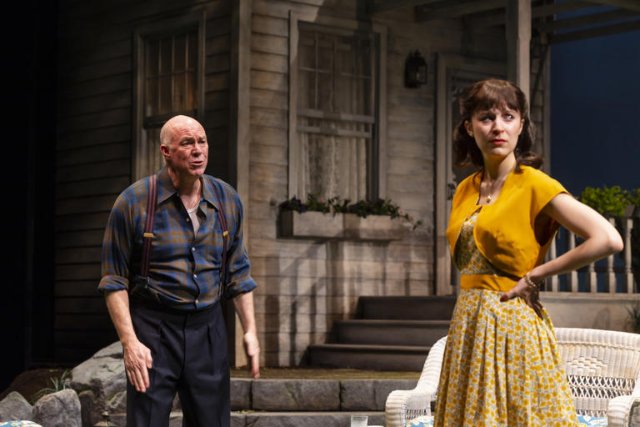All My Sons by Arthur Miller
At Hartford Stage
By: Karen Isaacs - Apr 26, 2024
The audience gasped in the final moments of All My Sons, the Arthur Miller play getting a splendid production at Hartford Stage through Sunday, May 5.
The gasp showed that you don’t need to fiddle around with classic plays by changing time period or place. (The production of The Enemy of the People now on Broadway proves the same point.)
A play can have relevance, and audiences will understand it even if it is set decades ago before many in the audience were alive.
This production also shows that you can make a point without hitting audiences over the head with it. Tell a good story, and the audience will “get it” without any epilogue telling them what they should feel. Too often, new plays feel the need to “explain it” to the audience.
Marsha Mason, who stars in this production, feels All My Sons, an early play by Miller, one of his best. I agree. And this production proves it.
It is 1946, and Chris Keller has invited Ann Deever from NYC to visit with the plan to propose to her. The visit is complicated and fraught with tension. Ann’s family lived next door to them growing up and was engaged to Chris’ older brother, Larry, whose plane crashed during WWII. His body was never found. Add to that Ann’s father (Steve) and Joe Keller were partners in a firm that manufactured parts for airplanes during the war. Some defective parts were shipped to the Army, used, and resulted in 21 deaths. Both men were investigated, but while Joe was eventually exonerated, Steve is still in jail.
One further complication is that Chris’ mother, Kate (Marsha Mason), is convinced that Larry is still alive and will turn up. The idea that Ann might have romantically moved on is unacceptable. Plus, Ann’s brother, George, arrives, having visited their father in jail for the first time. He is now convinced that his father is not responsible.
In this three-act play (though performed at Hartford Stage with just one intermission,) once everything is set in motion, it is clear that the inevitable will occur. Yet, that doesn’t prevent you from being on the edge of your seat. Miller builds suspense to that climactic moment. By then, you know it is inevitable.
Miller’s genius is to create the situation and force the audience to think about what they would have done in that situation. The options aren’t good. Each one has a huge price to pay.
The set by Riw Rakkulchon is splendid. A typical suburban house of the period set on a lush green lawn with neighbors on all sides. It is the type of neighborhood where someone is always dropping by to chat. All it needs is a white picket fence to complete the picture.
In this production, Marsha Mason as Kate is as much the main character of the play as is her husband, Joe, played with bluster and assuredness by Michael Gaston. Gaston seems just as much a frightened man, as Steve is described as.
Mason carefully builds the character. Just when you think you can discount her – a mother who refuses to accept reality and expects all others to go along – she throws in a subtle moment that causes you to ask the underlying question: what does she know or suspect?
In this production, it seems that the women are the stronger and more honest people—from Kate to Ann, played with simple determination by Fiona Robberson, to Yadira Correa as the doctor’s wife, Sue, to Caitlin Zoz and the next-store neighbor, Lydia. Each is fully in touch with reality. That doesn’t mean we always like them, but they are practical people.
The men live in a world of self-delusion. Each is still a dreamer; the women get on with life.
Reece Dos Santos is one note as Ann’s brother, George, who arrives with the intention of breaking up the romance and settling scores. All he conveyed was anger.
As Chris, Ben Katz started the show, not as nervous and uncertain about asking Ann to marry him, but stiff. He finally let loose in the second act.
The director, Melia Bensussen, clearly understands this play and its universality. She draws out many of the nuances from the play and its characters.
Miller often writes about relationships between fathers and sons or brothers. Yet, while the women often seem to be afterthoughts, his women are stronger and more resilient than the men; they see the world more clearly and aren’t afraid to say it. They are survivors.
All My Sons, the second Miller play to receive a fine production in Connecticut this year, leaves you pondering the questions he raises.
Contact HartfordStage.org for tickets.

